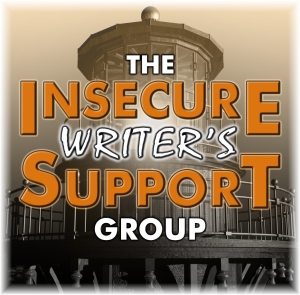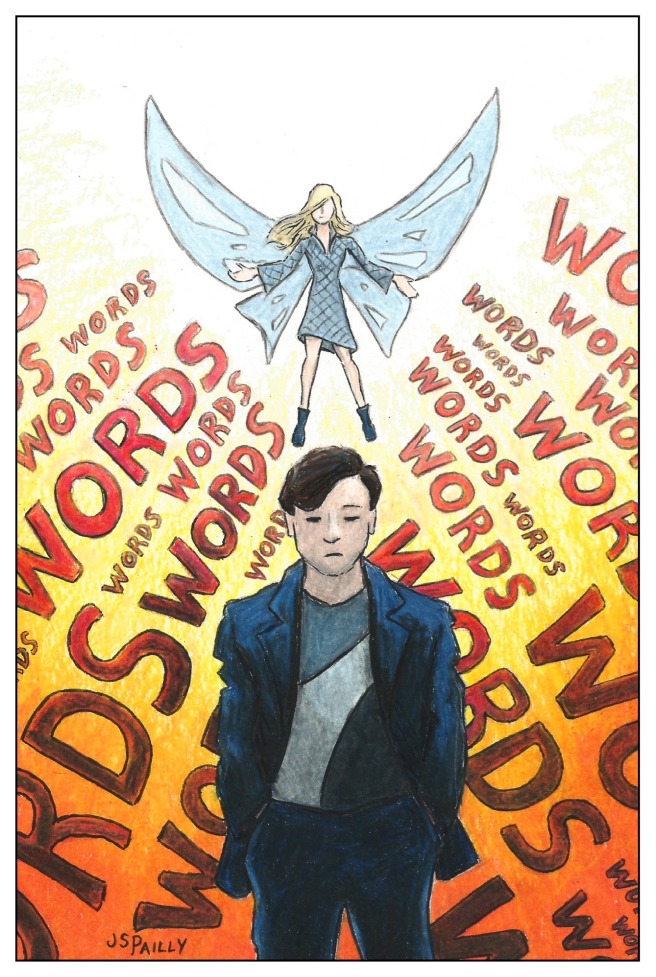Hello, friends! Welcome to this month’s meeting of the Insecure Writer’s Support Group, a blog hop created by Alex J. Cavanaugh and co-hosted this month by Jemima Pett, Nancy Gideon, and Natalie Aguirre. If you’re a writer and if you feel in any way insecure about your writing life, then this is the support group for you! Click here to learn more!
I’m sorry, but I’m participating in the A to Z Challenge this month, and I just don’t have enough time to write an IWSG post, too. Fortunately my muse has gotten used to writing these IWSG posts without me, so I’m going to turn the floor over to her. My muse has something to say. Perhaps it is something you and your muse would like to hear.
When my writer first started writing science fiction, he thought he wouldn’t have to do any research. He thought he could just make stuff up. As his muse, I quickly disabused him of that assumption. No, science fiction need not be factual about everything all the time, but mixing a generous helping of facts into the fiction will add a sense of credibility to a Sci-Fi story, making it that much easier for readers to suspend their disbelief.
This blog exists because my writer thought that writing a blog about science would force him to do the research he needed to do to become a better science fiction writer. And that worked. My writer does his research now, and his Sci-Fi writing has improved as a result. Now one of his favorite ploys, when writing Sci-Fi, is to try and make real science sound made up while making the stuff he made up sound like real science.
But that’s a game for science fiction writing only. When my writer is writing this blog, he has developed a new anxiety, a new insecurity. He is terrified that he might unwittingly spread misinformation about science on the Internet. It is not unusual for my writer to get emails from science students—or even science teachers—asking him questions about the topics he blogs about. It’s flattering, of course, but also a little bit scary, because he very much does not want to lead anyone astray in their science education.
This year’s A to Z Challenge is, as usual, a science heavy project. So my writer tries to word things carefully, to ensure that he won’t mislead anyone. He debates with himself which details must be included in a blog post and which can be safely glossed over or ignored. He double checks his sources, and if he’s still not sure he’s got his science facts straight, he’ll either state that uncertainty explicitly, or he’ll cut that section entirely out of the post. And despite all of that, he knows that he will still make mistakes.
All he can do is promise himself (and his readers) that he will correct his mistakes as soon as he finds out about them, because there is far too much misinformation about science on the Internet already. My writer very much does not wish to make that problem worse.


I had the same feeling the first time a scientist shared one of my posts. My way of coping is similar: make clear I’m just an amateur learning right along with the reader, and be clear about sources and reasoning. And definitely be willing to admit when I was wrong. It’s all we can do.
LikeLiked by 2 people
Yeah, that’s basically my approach. Not something I thought about when I started, but I feel strongly now that I have a moral responsibility to get this stuff right and admit frankly when I mess up.
LikeLiked by 1 person
Smart idea for a blog.
Your science is far more factual than any news source, so rest assured.
LikeLiked by 1 person
That’s one of the frustrating things about trying to do this sort of research. So many otherwise reputable news sources do such a sloppy job with science news. And that’s why I started reading scientific papers, too: to make sure scientists are actually saying the things the news says they’re saying.
LikeLike
I used to feel the same way when I was teaching English courses at a community college. I was always afraid I was on edge of providing the wrong answers and information to my students. However, I learned that when I wasn’t sure to be honest and let them know that I’ll double-check.
I’m not a scientist so almost all my science fiction stories that I write I have to research and internet helps but you have to make sure you find the right or reputable resources. That can be a challenge.
LikeLiked by 1 person
Sounds like you were a good teacher. I always appreciated it when teachers felt confident enough in themselves to admit when they didn’t know something. As opposed to teachers who were dogmatic and over-assertive about everything they told us.
LikeLiked by 1 person
“make real science sound made up while making the stuff he made up sound like real science.” He’s on his way to being a successful health guru.
LikeLiked by 2 people
Oh no… I hadn’t thought about that, but writing Sci-Fi and being a health guru do involve a similar skill set.
LikeLike
Good luck with your A to Z challenge. Even in a romance world, one of the big reasons I stick with contemporary is because I’m nervous about the research that would be required for a historical setting. Major shout out to you and writers like you who can do the work and build epic worlds that blend fact with fiction.
LikeLiked by 1 person
Thanks, friend! Like my muse said, I really didn’t want to do my research at first, but once I started, I found it was more fun than I expected.
LikeLike
That’s all any of us can do when it comes to writing science fiction—or not. I stick to do the best I can and settle for where it lands.
Anna from elements of emaginette
LikeLiked by 1 person
That’s a good attitude. When I’m writing Sci-Fi, the needs of the story come first. Facts are secondary. But when I’m writing for this blog, I have to hold myself to a much higher standard.
LikeLiked by 1 person
Are we that special? hehehe
LikeLiked by 1 person
LOL. I love the stance you’ve taken with this blog. The premise is highly original.
LikeLiked by 1 person
Thanks!
LikeLike